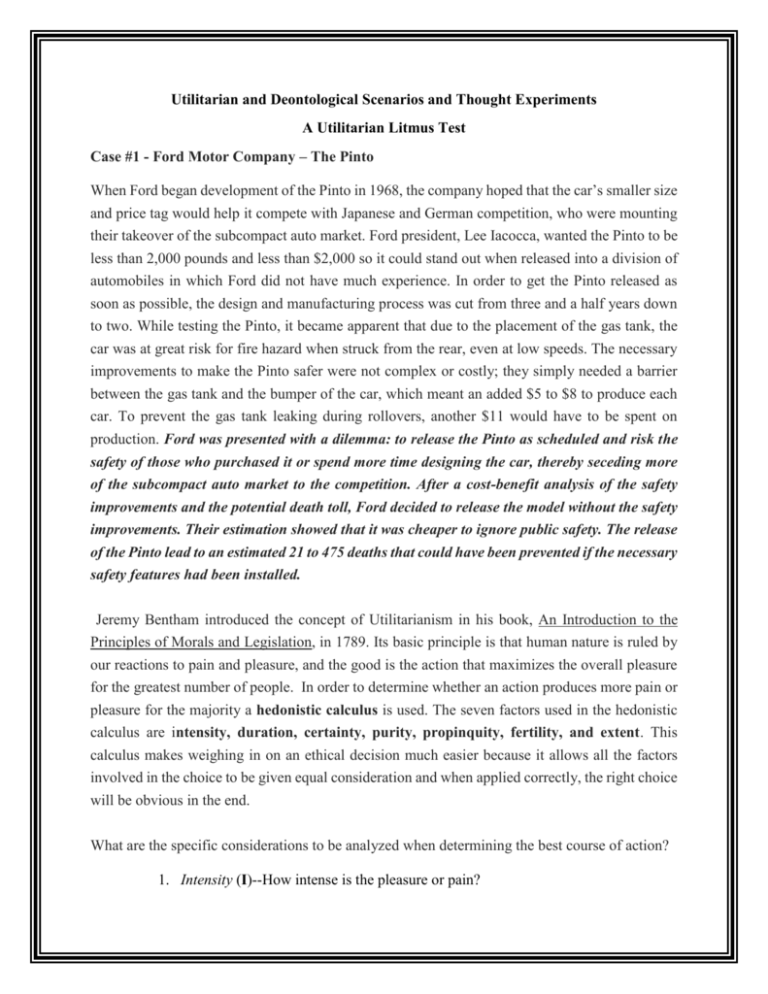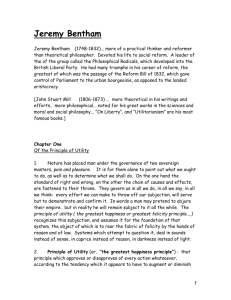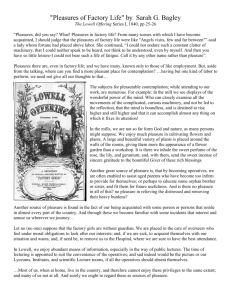Case #1 - Ford Motor Company – The Pinto
advertisement

Utilitarian and Deontological Scenarios and Thought Experiments A Utilitarian Litmus Test Case #1 - Ford Motor Company – The Pinto When Ford began development of the Pinto in 1968, the company hoped that the car’s smaller size and price tag would help it compete with Japanese and German competition, who were mounting their takeover of the subcompact auto market. Ford president, Lee Iacocca, wanted the Pinto to be less than 2,000 pounds and less than $2,000 so it could stand out when released into a division of automobiles in which Ford did not have much experience. In order to get the Pinto released as soon as possible, the design and manufacturing process was cut from three and a half years down to two. While testing the Pinto, it became apparent that due to the placement of the gas tank, the car was at great risk for fire hazard when struck from the rear, even at low speeds. The necessary improvements to make the Pinto safer were not complex or costly; they simply needed a barrier between the gas tank and the bumper of the car, which meant an added $5 to $8 to produce each car. To prevent the gas tank leaking during rollovers, another $11 would have to be spent on production. Ford was presented with a dilemma: to release the Pinto as scheduled and risk the safety of those who purchased it or spend more time designing the car, thereby seceding more of the subcompact auto market to the competition. After a cost-benefit analysis of the safety improvements and the potential death toll, Ford decided to release the model without the safety improvements. Their estimation showed that it was cheaper to ignore public safety. The release of the Pinto lead to an estimated 21 to 475 deaths that could have been prevented if the necessary safety features had been installed. Jeremy Bentham introduced the concept of Utilitarianism in his book, An Introduction to the Principles of Morals and Legislation, in 1789. Its basic principle is that human nature is ruled by our reactions to pain and pleasure, and the good is the action that maximizes the overall pleasure for the greatest number of people. In order to determine whether an action produces more pain or pleasure for the majority a hedonistic calculus is used. The seven factors used in the hedonistic calculus are intensity, duration, certainty, purity, propinquity, fertility, and extent. This calculus makes weighing in on an ethical decision much easier because it allows all the factors involved in the choice to be given equal consideration and when applied correctly, the right choice will be obvious in the end. What are the specific considerations to be analyzed when determining the best course of action? 1. Intensity (I)--How intense is the pleasure or pain? 2. Duration (D)--How long does the pleasure of pain last? 3. Certainty (C)--What is the probability that the pleasure or pain will occur? 4. Propinquity (nearness or remoteness) (N)--How far off in the future is the pleasure or pain? 5. Fecundity (F)--What is the probability that the pleasure will lead to other pleasures? 6. Purity (P)--What is the probability that the pain will lead to other pains? 7. Extent (E)--How many persons are affected by the pleasure? Case #2 The Cabin Boy - The Queen v. Dudley and Stephens The Defendants, Thomas Dudley (Mr. Dudley) and Edwin Stephens (Mr. Stephens) (Defendants) and two other gentlemen, Mr. Brooks and the victim, Richard Parker (Mr. Parker), were stranded on a boat for several days. When it appeared that the whole party would likely die of thirst and starvation, the Defendants decided to sacrifice Mr. Parker for the good of the rest. The defendants, Mr. Brooks and the victim Mr. Parker were English seamen. The group was cast away in a storm on the high seas and was compelled to put into an open boat that had no supply of food or water. After the group had been without food for seven days and without water for five days, the Defendants spoke to Mr. Brooks about sacrificing the victim Mr. Parker to save the rest. Mr. Brooks dissented and the victim was not consulted. Mr. Dudley suggested that if no vessel was in sight the next morning, they would kill the victim. No vessel appeared the next day, so Mr. Dudley with the assent of Mr. Stephens killed the victim. The three remaining castaways fed upon the victim Mr. Parker for four days at which time a passing vessel rescued them. Issue. Does the defense of necessity permit the killing of one person to save others? Held. No. At the time of this case the doctrine of necessity was still largely unexplored. Much of the prevailing authority at the time spoke of necessity in terms of what is now called self-defense, i.e. taking another’s life to safeguard one’s own. Lord Bacon provided some authority for the existence of the defense of necessity to lesser crimes. For example, a hungry man is not guilty of larceny for stealing food. However, the Queen’s Bench acknowledged that no court has ever accepted necessity as a defense to murder and for good reason. Permitting such a defense to be asserted raises poignant questions such as how does one measure the comparative values of lives and who decides such things. Further, specific to the present case, Lord Coleridge asks, “Was it more necessary to kill [Parker] than one of the grown men?” While this murder was arguably not “devilish” and even though the men probably would not have survived otherwise, Lord Coleridge held that there is never any absolute or unqualified necessity to preserve one’s own life. Once such a defense is allowed, there is no telling what atrocious crimes may be justified by the excuse of necessity. Case #3 – Cigarettes Save Lives and Money Philip Morris, the tobacco company, does big business in the Czech Republic, where cigarette smoking remains popular and socially acceptable. Worried about the rising costs of health care cost of smoking the government considered raising taxes on cigarettes. In the hope of fending off a tax increase, Philip Morris commissioned a cost vs benefit analysis on the effects of smoking on the national budget. The study found that the government actually gains from people smoking. The reason – although smoking imposes higher medical costs while they are alive, they die early and saves the government a lot of money on health care, pensions and housing for the elderly. According to the study once the positive effects of smoking are taken into account smoking gains the Czech Republic $147 million a year. Case #4 – Christians and Lions In ancient Rome, they threw Christians to the lions in the Coliseum for the amusement of the crowd. Yes the Christian suffers excruciating pain as the lion mauls and devours him. But consider the collective ecstasy of the cheering spectators packing the Coliseum. Case #5 - The Happiness Machine Suppose that you had the opportunity to step into a happiness machine. The machine would give you any experiences that you desired. While in the machine your neurophysiologists would stimulate your brain so that for example you would think and feel that you were winning an athletic event, writing a great novel, making a friend or enjoying a physically and psychologically satisfying experience. To avoid boredom the quality and types of happiness would be varied. Whatever types of experiences bring you happiness in real life would be simulated in your brain. All of the time you are enjoying interrupted happiness - you would be floating in a tank with electrodes attached to your brain. While in the tank you won’t have the feeling that you are there; you will feel as though the simulated experiences are really happening. In addition, the all the rest of your biological needs are taken car of. You would be free to leave the machine at any time although you know that everyone who ever entered the machine never chose to leave it. Isn’t pleasure, contentment, satisfaction and happiness what we all seek in life? What would you do in this situation? Case #6 – Trolley and the Surgeon (A)There is a runaway trolley barreling down the railway. Ahead, on the tracks, there are five people tied up and unable to move. The trolley is headed straight for them. You are standing some distance off in the train yard, next to a lever. If you pull this lever, the trolley will switch to a different set of tracks. However, you notice that there is one person on the side track. You have two options: (1) Do nothing, and the trolley kills the five people on the main track. (2) Pull the lever, diverting the trolley onto the side track where it will kill one person. Which is the correct choice? (B) A brilliant transplant surgeon has five patients, each in need of a different organ, each of whom will die without that organ. Unfortunately, there are no organs available to perform any of these five transplant operations. A healthy young traveler, just passing through the city the doctor works in, comes in for a routine checkup. In the course of doing the checkup, the doctor discovers that his organs are compatible with all five of his dying patients. Suppose further that if the young man were to disappear, no one would suspect the doctor. Jeremy Bentham (1748-1832) • There is one good, pleasure, and one evil, pain. John Stuart Mill (1806-73) Mill's version of utilitarianism was so different from Bentham's that it almost seems that he rejects it. Mill was concerned • Human nature is naturally motivated by to move away from what he once called a "two sovereign masters, pleasure and "swinish" philosophy based on base pain". We are pleasure-seekers (hedonists). pleasures, to something subtler. Other motives such as duty, respect, are irrelevant. • Goodness was based on more than just pleasure, but on the virtue of sympathy for • The empirical calculation could be done our fellow human beings, a concern for with a hedonic calculus which allocates their rights and our duty to promote the hedons of pleasure to different choices. common good. • Social goals should be fixed by aggregating personal goals in terms of maximizing pleasure and minimizing pain. • The aim of government is to harmonize conflicting interests by passing laws with appropriate penalties for those who cause pain to others - hence modifying their behavior. Bentham became convinced that the British Government was influenced solely by self-interest rather than some idea of the common good. He came to argue for the abolition of the monarchy, universal male suffrage (not just linked to land) and rule by parliament as judge of the common interest. • Pleasures were distinguishable between lower bodily pleasures and higher intellectual or spiritual pleasures - and if you wanted to know which was better ask someone who'd experienced both. • Mill was suspicious of universal male suffrage, and advocated education for all as a key to graduating to the happy life. • Mill was keen to see fairer distribution of wealth and income and rejected the extreme form of free market economics. • Mill argues for a weak rule utilitarianism. We maximize happiness by obeying laws and social conventions which experience has shown promote the common good such as respect for life, personal freedom and private property, or good manners and politeness. However, when two principles or rules come into conflict, such as the choice to lie to save my friend's reputation, I revert to being an act utilitarian - making my decision based on a balance of outcomes - choosing that action which maximizes happiness






